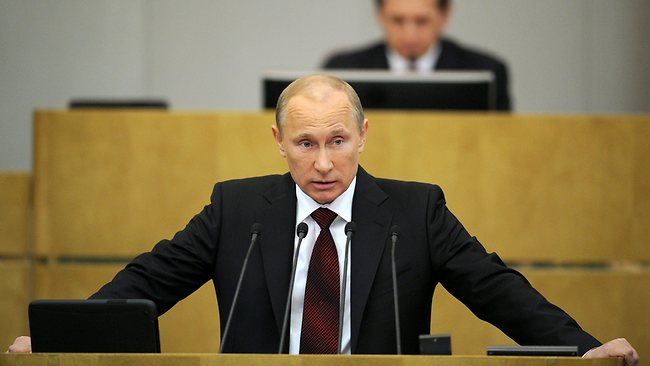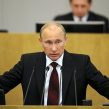
Putin Promises Russians a Great Future…While the Opposition Protests
Publication: Eurasia Daily Monitor Volume: 9 Issue: 73
By:

President-elect Vladimir Putin is still legally Prime Minister until his inauguration on May 7. As Prime Minister, Putin is required to present to the Duma (the lower house of parliament) an annual “report of government activities.” Putin has limited his appearances in parliament to the once a year mandatory annual report, making this week’s visit after a landslide presidential election victory in March 4, a very special occasion. Putin spent almost four hours in the Duma presenting the report, answering questions, exerting confidence and boasting of his achievements.
Putin was president for two consecutive four-year terms from 2000 to 2008, then Prime Minister from 2008 to 2012, and reelected as president for a third six-year term, using a legal loophole in the 1993 constitution that forbids running for more than “two consecutive terms.” Answering a question from the Communist Party fraction, Putin agreed “it would make sense” to change the constitution to allow any person only two presidential terms no matter consecutive or else and “we must consider it with the help of all fractions,” but added that such a change “would not be retroactive.” Putin insisted he has the right to 12 more years in the Kremlin: “I will have the possibility to work this term [2012-2018] and the next one [2018-2024] – no problem, if I choose and the situation allows” (https://premier.gov.ru/events/news/18671/).
To prove his moral right to rule Russia for 24 years “if he chooses,” Putin insisted that Western nations are today swamped with debt and unemployment, many European nations on the verge of bankruptcy and “today, losing their sovereignty,” while Russia is progressing with excellence. According to Putin, “In the beginning of 2012, Russian GDP exceeded the pre-crisis level of 2008” and “in two to three years, Russia will by one of the world’s top five economies.” Some “25 million quality jobs will be created in several years,” incomes and pensions will grow together with life expectancy and “even if oil prices will fall to $70 a barrel [from the present $110-120], we will be able to meet our social obligations.” Putin announced the Russian GLONASS global positioning system has been made fully operational and “this is no joke,” while the EU and China had managed to send into orbit only a handful of their navigation satellites (https://premier.gov.ru/events/news/18671/). This puts Russia on par with the US and gives the Russian military a potential capability to develop its own precision-guided weapons, fully independent of the Pentagon-controlled Global Positioning System (GPS), though such weapons do not seem to have appeared yet, and the GLONASS is still less reliable and less accurate than GPS.
Putin applauded Russia’s impending entry into the WTO and dismissed fears this may cripple Russia’s agriculture and other uncompetitive industries. Putin, an administrative workaholic, has been attempting for more than a decade to run Russia – by territory, the biggest nation in the world – as a family farm. This week in the Duma he suddenly got involved in a heated debate with the Communist Party fraction about cow foraging, announcing angrily, “I am stating the truth, we do not have any quality cattle, I discuss this problem each week.” Indeed, getting a locally-grown decent cow steak in Russia is still virtually impossible, but Putin is working on it. Putin announced that production of chicken meat has grown dramatically, that there is progress with pigs, and cows will come next (https://premier.gov.ru/events/news/18671/).
There are other impeding problems: corruption and nasty conditions to do business that impede investment and technological innovation. Putin promised to stamp out corruption first of all in the defense industry to promote modern mass weapons production. The number of Russians of working age is rapidly decreasing, making plans to increase the number of new jobs somewhat meaningless. Putin acknowledged the problem, but did not spell out any serious practical solutions. To continue economic growth when the national workforce is dwindling, Russia needs millions of immigrants, since even if attempts to increase the birthrate succeed, this will not produce any extra workers anytime soon. But in Russia, where extreme nationalism is on the rise, advocating immigration is political suicide.
Of Russia’s population of over 140 million, just over 80 percent are ethnic Russian Slavs. This week in the Duma, Putin stressed his Russian ethnic purity, close connection “to this country and nation” and Orthodox Christian faith that may be documented in his family “to the 16th century.” Putin announced that ethnically “Russian people [as apposed to minorities] are the backbone” of Russia. Still Putin opposed a Communist Party proposal to change the first line of the constitution from: “We, the multinational people of the Russian Federation” to “We, the Russian people, and the people who joined them.” Putin fears that dividing Russian citizens into true Russians and “second class” minorities may “fracture our Federation,” which will harm “the true Russia people” (https://premier.gov.ru/events/news/18671/).
Putin called NATO a “Cold War relic,” but conceded that in Afghanistan the West is acting with a UN mandate and in overall Russian interest. Despite criticism by Communists and nationalists, Putin approved the use of an airbase in Ulyanovsk as a hub of NATO cargo transit in and out of Afghanistan.
As an experienced ruler, Putin promised plenty, offering something to everyone – on the condition that his total dominance is not questioned. But the situation in Russia has changed. The opposition Just Russia party, supported by the prodemocracy opposition movement For Just Elections, is protesting alleged mass vote rigging in the March 4 election of the mayor of Astrakhan, a city situated on the Volga river delta. Oleg Shein of Just Russia, who lost in Astrakhan to the ruling United Russia, is on the 28th day of a hunger strike to protest the fraud and is allegedly in a life-threatening medical situation. The Just Russia fraction (64 of 450 seats in the Duma) demanded Putin’s intervention in the situation. When he declined, advising to address the issue in court, the opposition faction staged a noisy walkout during Putin’s address (RIA Novosti, April 11). It is common knowledge that the judicial system in Russia, as well as electoral commissions, are under Putin’s thumb, lacking any sort of independence.
A public walkout directly in Putin’s face has been unheard of before in Russia. Putin’s landslide election mandate may have gone sour before his inauguration; and his overconfidence in six or 12 more uninterrupted years in the Kremlin may turn from a fairytale to a nightmare.




